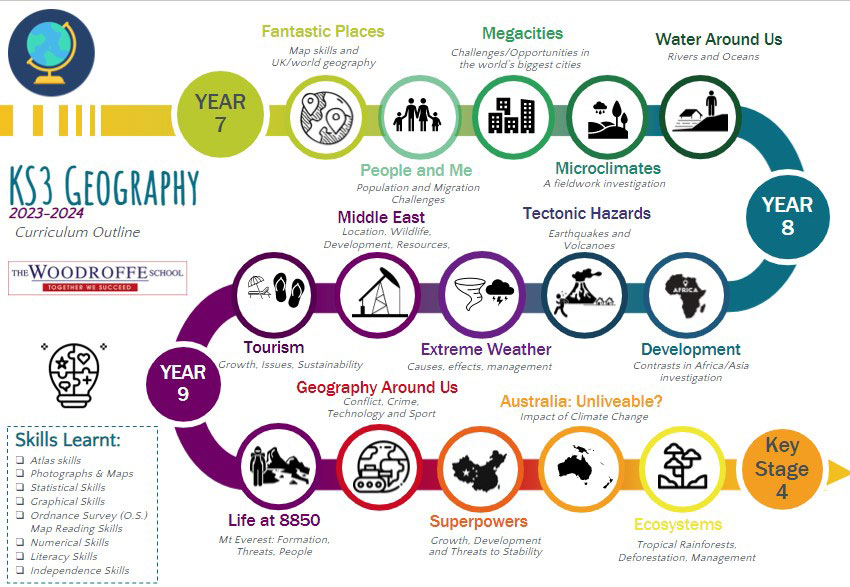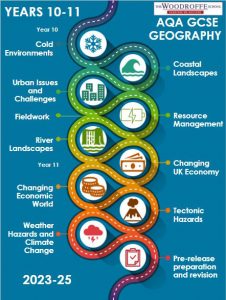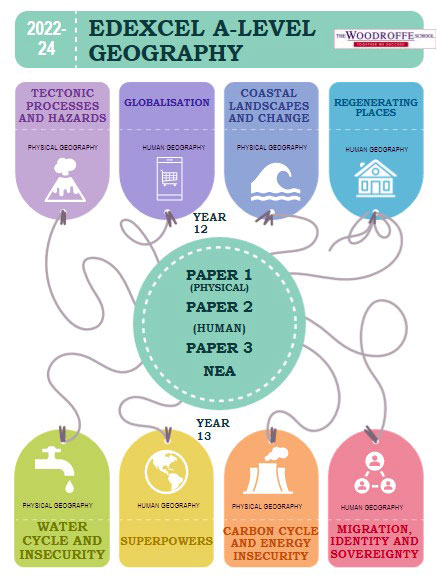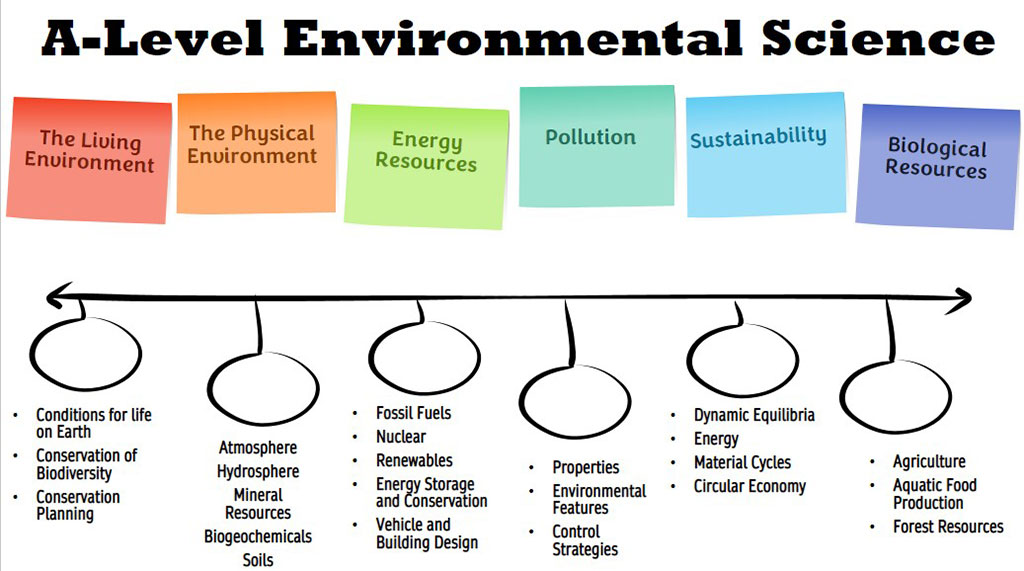Geography
At Woodroffe we consider ourselves to be one of the luckiest geography departments in the country. From our classrooms we have fantastic views over Lyme Bay to Golden Cap. We truly are a Jurassic Coast school.
Our department always look to ensure the students have a sense of awe and wonder of the world around them. We look to make full use of our location with trips down to Lyme Regis to study the coastline management.
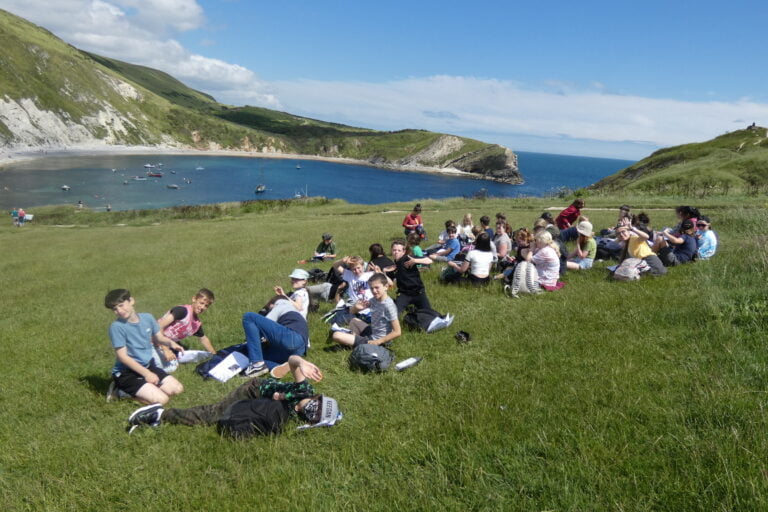
What is the world like? Why is it like that? How will the world change? How does this affect myself and others?
Geography is a fascinating subject that links the school locality to communities in and around the world, as well as expanding awareness of both local and global issues. At Woodroffe, the aim is to bring the subject to life by encouraging enquiry, discussion, individual research, reading, role-play, fieldwork and practical assignments.
At Woodroffe we consider ourselves to be one of the luckiest geography departments in the country. From our classrooms, we have fantastic views over Lyme Bay to Golden Cap. We truly are a Jurassic Coast school.
Our department always look to ensure the students have a sense of awe and wonder of the world around them. We look to make full use of our location with trips down to Lyme Regis to study the coastline management as well as to Exeter, Chesil Beach, Dartmoor and beyond.
Assessment
The department employs a variety of methods to assess each student’s progress which provides a clear picture of student attainment and helps staff and students to focus on areas for development. The department aims for students to be aware of their achievement and, more importantly, to know what they need to do next to progress further.
Facilities
The department has three new classrooms with fully integrated Smart Displays plus tablets that students use for research and project work, as well as making use of the School Library and ICT rooms. Students also benefit from a well-stocked field cupboard allowing outdoor educational experiences to take place both locally and further afield. Our classrooms have fantastic views across Lyme Bay.
Additional Activities
In Year 7 students conduct fieldwork at Lulworth Cove & Maiden Castle; Year 8 study tourism in Lyme Regis; Year 9 enjoy fieldwork on Dartmoor and visit Monkey World. Key Stage 4 visit Exeter & Dawlish Warren and Key Stage 5 study the local area as part of their Non-Examination Assessment coursework. There are also visits to Swanage, Studland, Boscombe and an overseas residential trip to Italy.
Mr B Williams, Head of Geography
Year 7
Students are introduced to the basic concepts of Geography including map work, Population, Migration and life in Megacities. Physical Geography topics include Oceans and Rivers. The emphasis is on building foundational skills that allow students to investigate the world around them and develop their own sense of place. Local fieldwork is undertaken both on the school site and at Lulworth Cove.
Years 8
Students build on their knowledge and study topics such as Extreme Weather and Tectonic Hazards (Earthquakes and Volcanoes) as well as the continents of Africa and Asia and the Middle East. Students undertake local fieldwork in Lyme Regis, whilst investigating Tourism.
Year 9
In Year 9, students explore Mt Everest and look at the geography that affects our day to day lives. Students build their world knowledge and how it links to events in the news, such as the role of dominant nations such as China and the USA in shaping world politics. They will also investigate how climate change is affecting Australia. In the summer term, students begin to study Ecosystems and Tropical Rainforests, in preparation for starting their GCSE Geography studies fully in Year 10. Fieldwork includes a trip to Dartmoor and Exeter’s Energy to Waste Plant.
Year 9 Environmental Science
We live in interesting times. There are 1.5 billion more people living on the planet than there were in the year 2000. Our lifestyle demands that we use more materials, use more energy, and create more waste than ever before. As poorer countries become richer, they too will demand a similar lifestyle. So what is the impact of this on the environment? More importantly, what can or are people doing to reduce these problems and who has responsibility for “the environment”? This is the role of the Environmental Scientist – to find out about environmental problems and then identify solutions to deal with them. These range from investigating a locally polluted stream, to dealing with the challenges arising from global climate change to putting pressure on politicians to act and reduce plastic pollution. We will investigate the impact of humans on our wildlife and how we can conserve and support endangered species. So, if you have ever thought or cared about environmental issues and want to do something to address them, then this is your opportunity to do just that!
Year 9 Geopolitics
Geopolitics is an opportunity for students to build up a greater understanding of how global affairs are interconnected and how individuals, nations and organisations have influenced world affairs. This enrichment course will allow students to study the links between the culture, history and current role of places today. How do countries influence each other and which figures both past and current are responsible for this? What are the causes and consequences of migration? How do different styles of governance create both conflict and global solutions? How do countries work together? We live in an increasingly globalised community, and this can create problems as well as opportunities for people around the world. Key topics that will be studied include:
- Human rights and migration
- Conflict zones
- Methods of controlling and exerting power
- Solving global challenges
This course will increase students’ awareness of global affairs as well as providing key knowledge and skills for those who wish to study subjects such as History, Geography, Law, Religious Studies, Sociology and Government & Politics at either GCSE or A level.
 Years 10 & 11
Years 10 & 11
At GCSE, we follow the AQA specification where students study a variety of physical and human topics such as Cold Environments, Tropical Rainforests and Climate Change. The course explores a wide range of issues affecting the UK as well as places experiencing rapid change, such as Lagos, Nigeria.
All students are expected to undertake two fieldwork projects which are written up and discussed in the final exam. This will involve a full day’s fieldwork in Exeter city centre and at Dawlish Warren.
 Geography
Geography
Geography and/or Environmental Science A Level are available if students gain a grade 5 or above in Geography or a related subject. We follow the Edexcel specification, which covers topics such as the Coastal Zone and Tectonic Hazards and contemporary topics that explore the relations between the world’s superpowers.
All students are expected to undertake four days fieldwork as part of this course. This includes a residential visit to the Isle of Purbeck where we study coastal processes and ecosystems as well as Urban Regeneration in Bournemouth. Part of the A Level assessment is a project based individual fieldwork carried out in the Lyme Regis area. We also look at other ways for students to apply their knowledge. This has included volunteering at the Sidmouth Science festival and supporting younger field groups with their lessons and fieldwork.
As geographers, we also look to visit and learn about other environments away from Dorset. The department has planned a residential trip to Naples, Italy for October 2023 – a chance to visit Vesuvius and the stunning Amalfi Coast!
For more information on the course please click on the website here.
Environment
Following the AQA syllabus, Environmental Science allows students to investigate our ever increasing conflicting relationship with our surrounds. Whether it is the management of woodlands, the conservation of species to identifying and recording pollution events there are a lot of questions to be addressed as we move forward into the 21st century.
For more information on the course please click on the website here.

